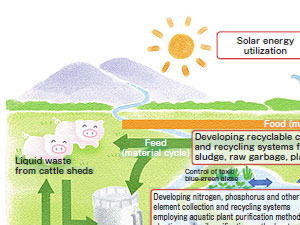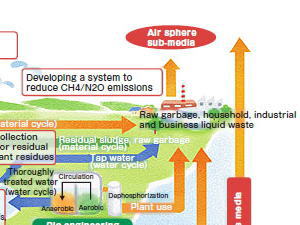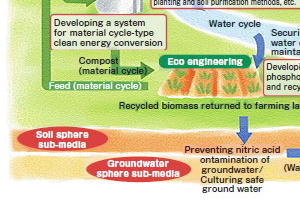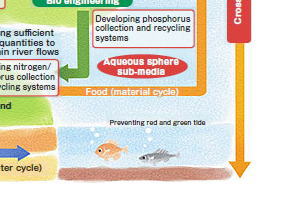
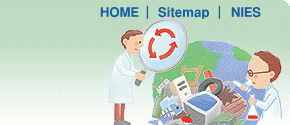


In Japan, we treat of more than 80% of the municipal solid waste with advanced thermal treatment technologies (incineration with power generation or gasification and pyrolysis
system) of which we can boast to the rest of the world. One of themes covered in this reach activity is to develop maintenance and management technologies to ensure
satisfactory performance of these treatment facilities from several viewpoints including operation safety, environmental loads, recovered material quality and economy.
In the meantime, we cannot reduce waste to nil however hard we may promote the 3Rs. Waste left after all such efforts needs to be disposed to landfill.
Another objective of this research activity is to establish a technology system to realize the ultimate concept of final disposal: "Only waste that turns into or can be transformed into soil should finally be buried." Considering the above as the premise of our research, we have figured out three new types of final disposal sites.
- Storage type: landfill site that will safely accommodate recyclable resources that are generated in large quantities but that are not valuable enough to justify immediate recovery at the time
- Land reclamation type: landfill site that will permit unrestricted post-landfill use in a short time by accepting only inert waste whose quality is close to earth or soil
- Stabilization accelerating type: landfill site that employs technologies to accelerate stabilization to ensure post-landfill use after a specified time period
We will also develop a technology system covering site selection, landfill structure, monitoring, leachate management, and quality control of
construction and management to ensure final disposal site safety and reassurance. We will study about waste stabilization mechanisms,
which provide the basis of such technology development.
We consider that our mission is to develop the above-mentioned technology systems, reflect them in the institutional system, and contribute
to the establishment of a safe and reassurance society.
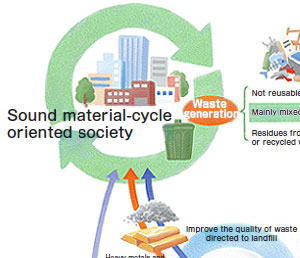
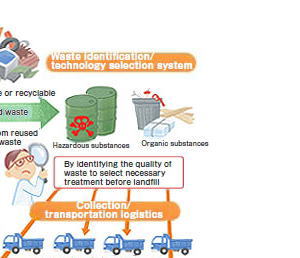
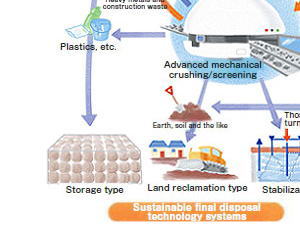
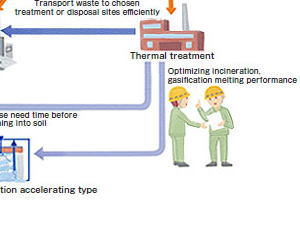
- Understanding the behaviors of candidate persistent organic pollutants (POPs)
- Developing simplified routine testing methods for checking safety of recycling and disposal processes and recycled product
- Developing simplified measurement and comprehensive assessment of dioxins-like compounds by bio-assay test
We will back up to clear negative legacies through the following research: (1) follow-ups of waste PCB treatment projects operating now; (2) surveys to ensure appropriate treatment of waste pesticides; and (3) development of design for a program to remediate contamination of improper disposal sites taking into consideration for environmental risks.
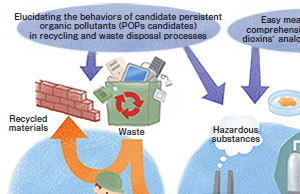
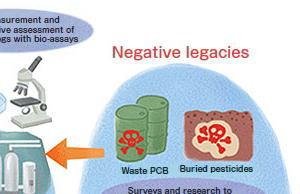
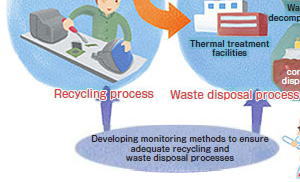
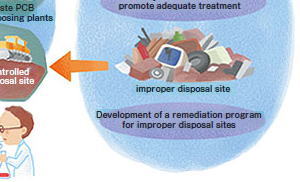
For this reason, we will undertake research activity to establish efficient, thorough treatment methods to deal with liquid, organic waste such as sludge resulting from household and industrial liquid waste treatment processes. Specifically targeting raw sewage, household and disposer liquid waste, we will conduct research on system conversion technology to convert existing single/combined treatment Johkasou to advanced systems capitalizing on higher-performance treatment technology, better maintainability, and reduced infectious microorganism risks and technology development for advanced-treatment Johkasou. Taking advantage of joint research programs promoted with universities, publicly run local testing and research organs, and private businesses on an industry-governmentuniversity cooperation basis, we will conduct analysis and assessment using lab-scale and actual treatment plants to understand bio engineering such as Johkasou, etc., eco engineering concerning aquatic plantsoil purification technology, raw garbagerecycling systems, and so on including removal mechanisms and impacts on the ecosystem from explosive blue-green algae growth in treated water, etc. Further, we will develop adequate methods to evaluate the performance of such treatment systems with molecular biological analysis and microorganism risks taken into consideration and methods to evaluate the environmental improvement effect in the reduction of greenhouse gas emissions and the addition of nutrient salt removal functions. We will promote this research program in a bid to establish liquid, organic waste-recycling technology systems and technology/assessment manuals tailored to regional characteristics.
